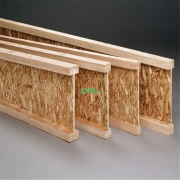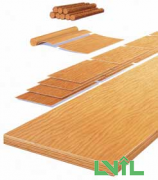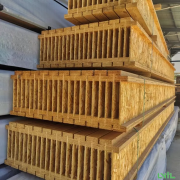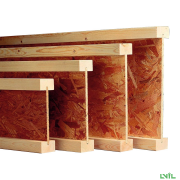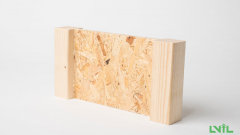Key Benefits of Engineered Wood I-joists
- Superior Strength-to-Weight Ratio:Outperforms traditional dimensional lumber in load-bearing capacity while remaining lightweight, reducing structural strain and simplifying handling.
- Dimensional Stability:Resists warping, twisting, and shrinking due to moisture or temperature fluctuations, ensuring long-term structural integrity.
- Design Flexibility:Enables longer spans (up to 60+ feet) without intermediate supports, ideal for open floor plans, vaulted ceilings, and modern architectural designs.
- Sustainability:Manufactured from fast-growing, renewable wood species and engineered to minimize waste. Supports green building certifications (LEED, FSC).
- Cost-Efficiency:Reduces labor costs through prefabrication and ease of installation. Minimizes material waste compared to traditional lumber.
- Consistent Quality:Factory-produced under strict quality controls, eliminating natural defects (knots, splits) found in solid timber.
- Fire and Pest Resistance:Can be treated with fire retardants and borate-based solutions to meet building code requirements and deter termites.
- Energy Efficiency:Compatible with advanced insulation systems, enhancing thermal performance in floors, walls, and roofs.
Key Features
- Composite Structure:Flanges: High-strength laminated veneer lumber (LVL) or solid sawn lumber for top/bottom load-bearing edges.Web: Oriented strand board (OSB) or plywood core, optimized for shear resistance and lightweight performance.
- Customizable Sizes:Available in depths ranging from 9.5" to 24"+, with flange widths tailored to specific load requirements.
- Precision Engineering:Computer-aided design (CAD) ensures uniformity and compatibility with modern construction software (e.g., BIM).
- Ease of Integration:Compatible with hybrid systems (e.g., steel connectors, concrete floors) and prefabricated wall panels.
- Code Compliance:Meets international building standards (e.g., ICC-ES, APA PRI-400) for residential, commercial, and industrial applications.
Applications Highlight
- Residential: Flooring, roofing, and wall framing in single-family homes and multi-story apartments.
- Commercial: Long-span solutions for offices, schools, and retail spaces.
- Industrial: Cost-effective framing for warehouses and factories.
- Renovations: Ideal for retrofitting older structures due to lightweight and adaptable design.
Comparison to Steel I-Beams
| Feature | Engineered Wood I-joist | Steel I-Beam |
|---|---|---|
| Weight | Lightweight, easy to handle | Heavy, requires machinery |
| Thermal Conductivity | Low (reduces thermal bridging) | High (insulation required) |
| Cost | Lower material and labor costs | Higher upfront and labor costs |
| Sustainability | Renewable, carbon-sequestering | Energy-intensive production |
| Corrosion | Not susceptible | Prone to rust without treatment |

